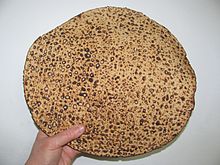 Handmade shmura matzo used at the Passover Seder especially for the mitzvot of eating matzo and afikoman | |
| Type | Dessert |
|---|---|
Afikoman (Mishnaic Hebrew: אֲפִיקִימוֹן ʾăpîqîmôn;[1] Modern pronunciation: אֲפִיקוֹמָן ʾăpîqômān) based on Greek epikomon [ἐπὶ κῶμον] or epikomion [ἐπικώμιον], meaning "that which comes after" or "dessert"),[2] a word originally having the connotation of "refreshments eaten after the meal",[3] is now almost strictly associated with the half-piece of matzo which is broken in two during the early stages of the Passover Seder and set aside to be eaten as a dessert after the meal.[4]
Based on the Mishnah in Pesahim 119b, the afikoman is a substitute for the Passover sacrifice, which was the last thing eaten at the Passover meal during the eras of the First and Second Temples and during the period of the Tabernacle. The Talmud states that it is forbidden to have any other food after the afikoman, so that the taste of the matzo that was eaten after the meal remains in the participants' mouths.[5] Since the destruction of the Temple and the discontinuation of the Korban Pesach, Jews eat a piece of matzo now known as afikomen to finish the Passover Seder meal.[4]
Customs around the afikoman vary, though they often share the common purpose of keeping children awake and alert during the Seder until the afikoman is eaten. Following Ashkenazi customs, the head of household may hide the afikoman for the children to find, or alternatively, the children may steal the afikoman and ransom it back. Chabad tradition discourages stealing the afikoman lest it lead to bad habits. Following Mizrahi customs, the afikoman may be tied in a sling to a child's back for the duration of the Seder.[6]
- ^ So spelled and vocalized in de Rossi 138 (Parma A) and Kaufmann A50; also spelled אפיקמון in the Cambridge manuscript and by Joseph Ashkenazi (as cited by Adeni).
- ^ "AFIḲOMEN". jewishencyclopedia.com. Retrieved 2012-10-24.
- ^ Babylonian Talmud (Pesahim 119b)
- ^ a b "Eating the Afikoman - Jewish Tradition". yahadut.org. Retrieved 2024-04-04.
- ^ "Afikoman – The Taste of Matza". yeshiva.org.il. Archived from the original on 2011-09-27. Retrieved 2010-03-31.
- ^ "Passover: The Afikoman". Jewish Virtual Library. Retrieved 2017-11-20.